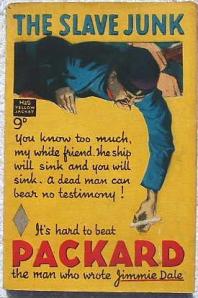Packard, Frank L. Two Stolen Idols. Toronto: The Copp, Clark Co., 1927, pp. 314.
Originally serialized in Short Story magazine in four parts: 10 Feb – 25 March 1927, it was published in book form the same year by George H. Doran Co. This was followed by the Canadian edition by Copp, Clark Co. and in the UK by Hodder & Stoughton, under the title of The Slave Junk. As far as I know, this is the only Packard book to undergo a title change when crossing the ocean. It was and is a common practice. The reasons for the title changes are not always evident. In this case it makes very little sense as the junk is not central to the plot while the idols are.
Tom Kingsley, a plantation owner in the south seas, is found dead, adrift in an open boat, without provisions or oars. He has been shot in the leg. His personal effects are gathered and forwarded to his brother and nephew. Among those effects are two small ivory idols. It is clear to everyone that Tom has been murdered. As Hsi Yan, captain of a Chinese junk that delivered him to Tom’s plantation, is also dead, the surviving Kingsley’s vow vengeance on the crew of the Chinese junk that delivered him to Tom’s place. Turns out that there is history between Hsi Yan, the Kingsley brothers, Tom and Robert, and Martin Sweeney. Decades ago the three broke up a slave smuggling operation of Hsi Yan’s. Yan swore vengeance on them and Tom looks to have been the recipient of that vengeance.
Before young Robert (Bob) Kingsley (the elder Robert Kingsley being confined to a wheelchair) can begin his quest for justice a gang of men break into there house and steal the idols. Bob attempts to fight them off, without success. Evidently there is more to the two idols than meets the eye.
Bob Kingsley follows the thieves and learns that they are part of the gang that killed Tom. He continues to follow them in the hopes that they will lead him to the rest of the gang. In an uncessful effort to prevent the gang from killing another man, Bob is seen running from the dying man, bloodied and carrying the knife, by the man’s sister, Verna Lyle. Of course, Bob falls for Miss Lyle. She believes that he has killed her brother and will not believe a thing he tells her. Poor Bob has to keep her from turning him into the police so that he can protect her from the Yan gang. They now believe that she has one of the idols, stolen from them by her brother. They don’t believe Bob that she does not possess the idol.
Two Stolen Idols is a decent south seas adventure. Packard wanted to write stories about south seas adventures. To that end he travelled by freighter for about six months during 1912-13 to Australia, New Zealand, Tonga, Samoa, Fiji, eventually landing up in Hawaii and San Francisco. This trip was to provide him with sufficient material for nine south sea novels.
Frank Packard was essentially a pulp writer. He was tremendously successful. His characters were somewhat more fleshed out than the typical pulp character was. His characters tended to have an inner life. There is also a strong moralistic element in Packard’s writing. Evil corrupts and that corruption is visible on the body. Likewise, a good man is clean and attractive. He knows what is right and does the right thing, irrespective of any personal cost. This is actually the greatest problem with Packard’s books. There is no moral ambiguity. The villains are always ugly and villainess and the hero is good looking and virtuous.
For example, at one point in the story Bob, with Verna, the woman he loves, have just managed to escape from the clutches of Yan’s gang. As they are rowing away from the ship on which they were prisoners, Bob realises that the ship is on fire. The crew is in a drunken stupor and will all perish is Bob dies not return and roust them to fight the fire. This will end with his and Velma’s recapture and probable eventual deaths at the gang’s hands. Bob agonises over wanting to return and rescue the pirates. He has to be restrained at gun-point to prevent him turning the boat around. Bob is very much a typical hero. He’s too good to be true, and that makes him somewhat of a predictable and dull character. To do the right thing he would sacrifice himself and the woman he loves.
“He, Bob Kingsley, had revisited Java Dick’s and the various other similar places where Java Dick had introduced him. Not that he might indulge in depravity himself— a white man who had any self-respect did not mess around in such quarters!— but the starkness of it interested him, and a certain element of danger, always latent in the unexpected where the line of demarcation between beast and human was so nearly at the vanishing point, lured him, as somehow, he did not know why, danger and excitement had always lured him.”(210)



